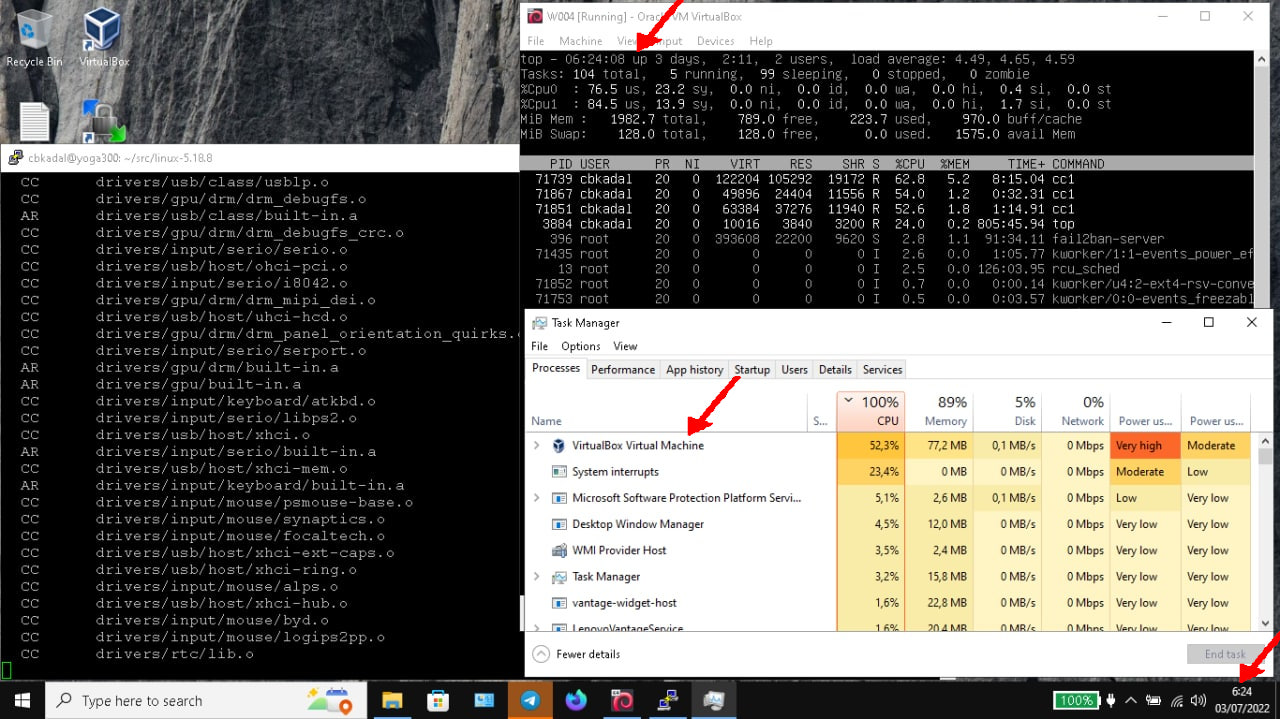VirtualBox: How to compile Linux Kernel on a Debian Guest
Debian Packages
- See
https://osp4diss.vlsm.org/osp-103.htmlfor more details.
Download Latest STABLE Kernel
- Fetch the latest STABLE kernel from
https://kernel.org/.
# START =============================================================
STABLE=$(wget -O - -o /dev/null https://www.kernel.org/finger_banner | awk '/stable/ {print $NF; exit}')
MAJOR=$(echo $STABLE | cut -d. -f1)
URL="https://kernel.org/pub/linux/kernel/v$MAJOR.x"
KERNEL="linux-$STABLE.tar.xz"
TARBALL="linux-$STABLE.tar"
PGP="linux-$STABLE.tar.sign"
KURL="$URL/$KERNEL"
PURL="$URL/$PGP"
# ===================================================================
# Wget the latest kernel stable version
wget -c $KURL
# ===================================================================
# Wget the signature
wget -c $PURL
# ===================================================================
# Locate Keys
gpg --locate-keys torvalds@kernel.org gregkh@kernel.org
Sign Key (optional)
gpg --sign-key gregkh@kernel.org
Uncompress the file and verify
# ===================================================================
# Uncompress
unxz $KERNEL
# Verify
gpg --verify $PGP $TARBALL
Extract TAR file
# ===================================================================
tar xvf $TARBALL
# ===================================================================
cd linux-$STABLE
Overkilled Cleaning Habit
Once in a while, some Bozo will ask about why not make distclean,
or make mrproper, or make clean.
Ok, this is the way!
make distclean; make mrproper; make clean;
AMD64 Option 1: Reusing ".config" files
caution
If you copied a wrong .config file, you might create a massive kernel with huge modules.
Consider copying a working
.configfile from the/bootdirectory.Or, try to download this ".config" file
See also
Linux/AMD64 Kernel Config for VirtualBox.Or, try to reuse any .config file. * Run:
yes "" | make oldconfig
AMD64 OPTION 2: A .config file from scratch
- If OPTION 1 failed, consider making a
.configfile from scratch with:
make x86_64_defconfig
yes "" | make oldconfig
Menuconfig
make menuconfig
E.g., for cbkadal
General setup --->
(-cbkadal-10) Local version - append to kernel release
Kernel compression mode (XZ) --->
(cbkadal) Default hostname
<*> Kernel .config support
[*] Enable access to .config through /proc/config.gz
<*> Enable kernel headers through /sys/kernel/kheaders.tar.xz
Processor type and features --->
[ ] EFI runtime service support
Device Drivers --->
Firmware Drivers --->
[*] Disable EFI runtime services support by default
File systems --->
<*> FUSE (Filesystem in Userspace) support
<*> Character device in Userspace support
<*> Virtio Filesystem
Security options --->
[ ] NSA SELinux Support
[*] AppArmor support
[*] Enable introspection of sha1 hashes for loaded profiles
[*] Enable policy hash introspection by default
First legacy 'major LSM' to be initialized
(X) AppArmor
Kernel hacking --->
Compile-time checks and compiler options --->
[*] Install uapi headers to usr/include
Compile (make)
time make
- FYI Compile Time:
LinuxIntel(R) Core(TM) i5-9400F CPU @ 2.90GHzreal 3m5.825s
user 14m51.339s
sys 1m59.721saWindows 10Intel(R) Core(TM) i5-9400F CPU @ 2.90GHzreal 4m17.702s
user 21m29.718s
sys 2m21.400sLinuxLenovo E135 (AMD E2-2000 APU with Radeon(tm) HD Graphics)real 123m25,746s
user 211m58,046s
sys 28m1,298sLinuxLenovo Yoga 300 (Intel(R) Celeron(R) CPU N2840 @2.16GHz)real 69m6,574s
user 115m1,006s
sys 19m12,436sWindows 10Lenovo Yoga 300 (Intel(R) Celeron(R) CPU N2840 @2.16GHzreal 4580m11.804s (<span class="important-text">Yes, there is something wrong here!</span>)
user 6900m36.555s
sys 864m34.820s
- One more time (after fixing the Windows 10 drivers):
real 72m26.981s
user 114m32.041s
sys 24m54.993s
- One more time (after fixing the Windows 10 drivers):
Install
- User:
root- Use "sudo" if you wish.
- Change Directory (cd) to the linux kernel source!
# USER: ROOT ============
make modules_install
make install
make headers_install INSTALL_HDR_PATH=/usr
Known Boot Errors
ata1.00: Read log 0x00 page 0x00 failed, Emask 0x1
Linux Firmware
- URL:
https://git.kernel.org/pub/scm/linux/kernel/git/firmware/linux-firmware.git - E.g. TARBALL
linux-firmware-20220509.tar.gz- open the TARBALL
- Go to folder
linux-firmware-20220509/ - Copy the missing modules into
/lib/firmware/. E.g. (ROOT),
- E.g. TARBALL
cp -r i915/ /lib/firmware/
cp -r tigon/ /lib/firmware/
cp -r e100/ /lib/firmware/
cp -r rtl_nic/ /lib/firmware/
Old Modules
- You have to delete old modules
/lib/modulesand old config/boot/files manually. Do not forget toupdate-grub. - Visit
ROOT:
cd /lib/modules/
ls -al
cd /boot/
ls -al
Path: docs/virtualbox/compile-linux-kernel